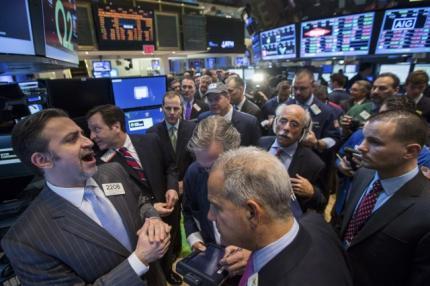Asia Shares Shaky, Global Bond Yields Down on Growth Concern
Bareksa • 27 Jun 2014

Trading Specialist Jason Blatt yells out a price for Q2 Holdings, Inc. during their IPO on the floor of the New York Stock Exchange (REUTERS/Brendan McDermid)
The U.S. economy contracted at a 2.9 percent pace in the first quarter, the worst performance in five years.
Bareksa.com - Asian shares got off to a tentative start on Friday after a weak performance on Wall Street, and global bond yields dropped on creeping doubts on the strength of the U.S. economic recovery.
Japan's Nikkei dipped 0.3 percent in early trade while South Korean shares fell 0.5 percent. MSCI's broadest index of Asia-Pacific shares outside Japan was flat.
Thursday's data showing a milder-than-expected increase in U.S. consumer spending in May fanned suspicions on the strength of the U.S. economy following shockingly weak first quarter U.S. GDP data.
The U.S. economy contracted at a 2.9 percent pace in the first quarter, the worst performance in five years.
"That's clearly a very weak figure. You can't just blame it all on bad weather," said Tohru Yamamoto, chief fixed income strategist at Daiwa Securities.
The weak data is starting to shake investors' conviction that the U.S. economy is heading for a modest but robust recovery this year.
"People are assessing where they think their second- and third-quarter, fourth-quarter, GDP estimates are going to be," said Wilmer Stith, co-manager in Baltimore of the Wilmington Broad Market Bond Fund.
"Even for those that are optimistic, it's like getting that 'F' in college in that first test; it's harder to raise that average up."
The S&P 500 slipped 0.1 percent while the pan-European FTSEurofirst 300 index fell 0.1 percent, hitting one-month lows.
Financial shares fell after New York's attorney general filed a securities fraud lawsuit against Barclays, accusing the British bank of giving an unfair edge in the United States to high-frequency traders.
Some traders also blamed hawkish comments from a Federal Reserve official for the weakness on Wall Street.
James Bullard, President of the St. Louis Fed, said that raising rates by the end of the first quarter in 2015 would be appropriate, based on his forecast that U.S. growth will register 3 percent for the next four quarters.
But his remarks were most likely used as an excuse for profit-taking in stocks, given they did not lead to any selling in U.S. bonds.
Indeed, the 10-year U.S. Treasuries yield fell to a three-week low of 2.516 percent on growth concerns.
Yields in Germany fell even more to a one-year low of 1.238 percent.
The U.S. dollar hardly budged, with the dollar index holding not far from one-month lows hit on Wednesday. It stood at 80.194, just 0.1 percent above Wednesday's low of 80.091.
A standout performer in the currency market was the Canadian dollar, which rose to six-month highs against the U.S. dollar after strong inflation data earlier this week raised doubts over how long the Bank of Canada will be able to stick with its neutral policy stance.
The Canadian currency traded as high as C$1.0684 on the U.S. dollar on Thursday and last stood at C$1.0693.
The yen also firmed in line with fall in U.S. bond yields, hitting a one-month high of 101.48 yen against the dollar . It last traded at 101.65. The euro was steady at $1.3612. (Source : Reuters)